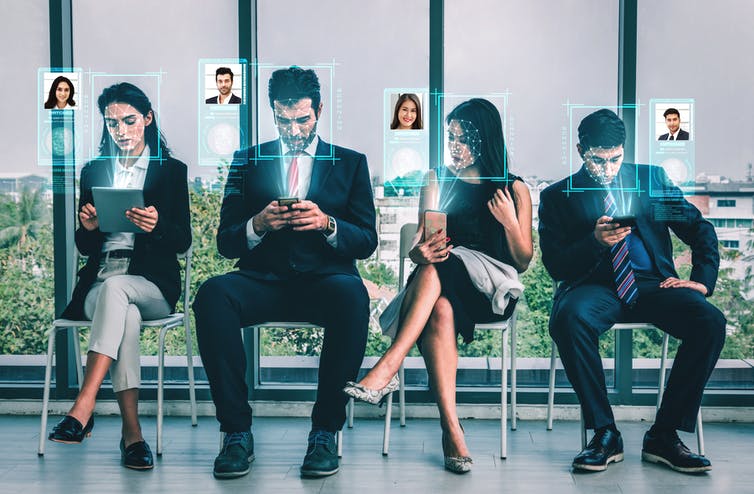The COVID-19 pandemic has made us reliant on digital technologies, eroding our privacy

The ongoing pandemic has accelerated and deepened our dependency on internet technologies. (Shutterstock)
In 2019, more than two billion people had an internet connection — more than 60 billion Google searches per month and 156 million emails were sent per minute.
These statistics hint at the intensity and penetration of the internet in our daily interactions. And over the past two years, the COVID-19 pandemic has contributed to the increase in our collective dependence on digital technologies for our professional, social and recreational needs. One of the outcomes of this increased dependence is the subjection of our everyday work and personal lives to increased surveillance.
Read more:
Explainer: what is surveillance capitalism and how does it shape our economy?
As a researcher at the Centre for Studies on Integration and Globalization at the University of Québec in Montréal, I investigate the power relationships between states and transnational digital firms — including Google, Amazon, Facebook, Apple, Microsoft and Netflix — on the issues of data governance and digital sovereignty.
‘Telemigrating’ work and social lives
In less than a decade, internet-enabled devices have become ubiquitous. Our connections with other people are mediated through screens, and this frames our social lives and becomes a sensor and catalyst for our everyday interactions. A digital social life is now a hallmark of our modern identity.
In some ways, a person has to maintain an online presence in order to exist in this new interconnected global society. This profound reality was highlighted when Facebook, Instagram and WhatsApp were recently affected by an unprecedented global outage. This global incident revealed both the scale and level of dependency we have on the tools that allow us to interact socially on a global scale.
This trend has been underway since the computer revolution of the 1990s and the subsequent expansion of social media and easier access to internet-connected devices. The COVID-19 pandemic has disrupted and amplified the digitization of our social life, with public health measures and stay-at-home orders leading in a massive and unprecedented shift to teleworking.
By the end of 2020, 71 per cent of workers in the United States had switched in whole or in part to teleworking. Our lives have “telemigrated” to online spaces and platforms.

The shift to working from home during COVID-19 relied on a global network of platforms.
(Shutterstock)
Technology regulating global interactions
These digital technologies become global regulators of our social relations. For example, videoconferencing platforms have become essential in our professional and personal lives on a worldwide scale. At the start of the pandemic, the meeting platform Zoom grew to 300 million daily participants in April 2020 from 10 million in December 2019. Similarly, in April 2020, Microsoft reached 200 million participants on its platform and 75 million users per month, an increase of 70 per cent compared to the previous month.
We have become cyber-citizens with collective needs regulated at the global level by private tech powers.
COVID-19 has accelerated and multiplied our reliance on digital technologies, turning us into cyber-citizens who are regulated by global technology companies. Powerful new social actors now hold power over our collective lives.
Personal data as property
Big tech monopolies are based on our collective dependence on their tools to interact in global society, and they trade in our personal data. This capitalist logic is based on the dispossession of internet users of the most basic right that modernity has conferred on the individual: the property right. This is not about a right of ownership over acquisitions or inherited assets — which would ultimately be external to the individual — but the right of ownership over what is inalienable: personal data.

The digital economy relies on circulating and profiting from our personal data.
(Shutterstock)
Technological solutionism — the application of technological solutions as a response to various societal challenges — has resulted in a reliance on what is referred to as consenting dependence.
As such, we are continuously dispossessed of the profits generated by the commercial and technological valuation of their data.
Read more:
5 ways the COVID-19 pandemic has forever changed cybersecurity
Our reliance on technology affects individuals, companies, production chains, administrations and governments. COVID-19 has ushered us into a critical turning point in history, where technology penetrates and structures our privacy at global level. This socio-technological phenomenon has political and societal implications, and we are as yet uncertain about its effects.

Brice Armel Simeu does not work for, consult, own shares in or receive funding from any company or organization that would benefit from this article, and has disclosed no relevant affiliations beyond their academic appointment.






